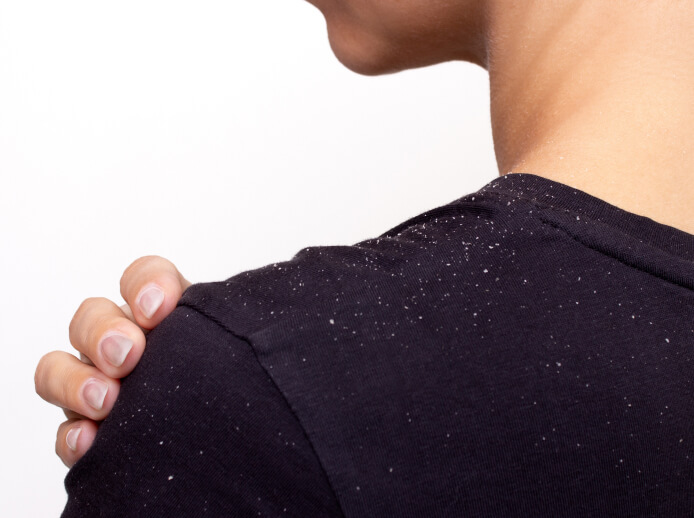Dandruff

What Is Dandruff?
Dandruff is a general term for flaky skin shed from the scalp. It is most noticeable as white flakes on the shoulders especially when one wears dark outfits. In itself, dandruff is not a specific diagnosis. Rather, it is caused by different conditions, the commonest being psoriasis and seborrhoeic dermatitis.
Seborrhoeic dermatitis is a common condition that affects any gender and age although it is more commonly seen after puberty. There is a self-limiting form that presents as a cradle cap in infants.
Seborrhoeic dermatitis tends to appear in areas of the body with a high density of oil-producing (sebaceous) glands. These include the creases at the sides of the nose as well as hair-bearing areas like the scalp, brows, moustache and beard areas, and the chest. It is caused by an inflammatory skin reaction, in susceptible individuals, to the yeast organism that thrives in these oil-rich areas.
This knowledge has resulted in a multipronged approach to the treatment of seborrhoeic dermatitis that targets oiliness, yeast, and inflammation.
How Is Dandruff Treated?
Mild seborrhoeic dermatitis of the scalp is often easily controlled with medicated shampoos which contain antifungal ingredients such as ciclopirox olamine, ketoconazole or zinc pyrithione. Most patients with seborrhoeic dermatitis prefer to wash their hair daily due to the greasiness of the scalp. On the other hand, it is not recommended that they use the medicated shampoos daily as this can -cause the hair to become dry, frizzy, and friable. A better alternative would be to intersperse the medicated shampoo with a mild shampoo that is designed for daily use. One such shampoo is the Scalp Care Shampoo which has the added benefit of a cool, mentholated feel to relieve the itch that is often associated with seborrhoeic dermatitis.
Mild cases of seborrhoeic dermatitis affecting non-hair bearing areas such as the face and chest can be treated with nonsteroidal anti-inflammatory creams such as Sebclair, pimecrolimus or tacrolimus or antifungal cream such as ketoconazole.
For cases with associated redness and itch, shampoo or drops containing steroids are very effective. Similarly, for moderate seborrhoeic dermatitis of the face, a steroid-based cream can be used on a short-term basis.
As seborrhoeic dermatitis tends to be recurrent, maintenance with non-steroid creams such as Sebclair, pimecrolimus or tacrolimus will provide good control without extended exposure to steroid creams. Antifungal creams like ketoconazole are also helpful for preventing recurrent flares of seborrhoeic dermatitis.
Lastly, resistant or more severe forms of seborrhoeic dermatitis can be treated initially with oral medication. These may be directed against the yeast (antifungal tablets like itraconazole) or the excess oiliness (isotretinoin). Once improved, the patient can then be switched over to creams and shampoos for maintenance.
Although seborrhoeic dermatitis is a benign condition, it can be frustrating and even distressing for patients who are either self-conscious about the appearance of the flakes on their clothing or disturbed by the itching of their scalps. With the wide range of treatment options available, many of which are safe for long-term use, these patients no longer need to put up with “snowflakes on their shoulders”.

| Main Line | : (65) 6734 1411 |
| Fax | : (65) 6235 5900 |
| Mon - Fri | : 8:30am - 5:00pm |
| Sat | : 8:00am - 1:00pm |
| Closed on Sundays and Public Holidays | |

